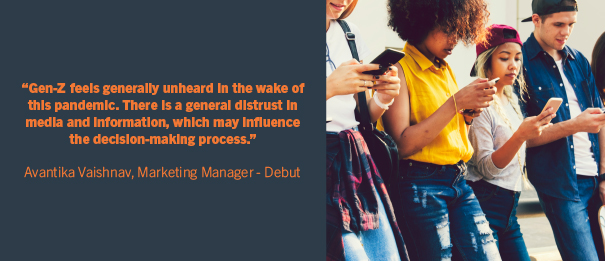Debut x Cov360 Report: How has Gen Z’s wellbeing and career prospects been impacted by the pandemic?

The pandemic has left Gen Z feeling voiceless, with the women of Gen Z feeling the most unheard. Combine that with a worry over the spread of misinformation and a general fear that they don’t have access to the support they need and things may appear to be a little bleak for Gen Z right now. Our study highlights all of this, and drills down into finding out how Gen Z are really feeling about their mental wellbeing, education and employment prospects, the vaccine and misinformation in the media.
Gen Z feeling voiceless, anxious and concerned about support
It nearly goes without saying now that the novel coronavirus has significantly impacted the mental health of people across different parts of society. With national lockdowns, self isolation, social distancing and sombre news reports about infection rates, fatalities and more, it’s understandable that people are struggling.

Gen Z, in particular, are feeling the effects of the pandemic, with school closures, universities going to remote learning and other situations causing upheaval across the board. When we surveyed a number of people from Gen Z, we found that all of them saw an increase in boredom, demotivation, anxiety, loneliness, depression, confusion, anger and fear over the course of the pandemic. That’s quite a lot to take in, and it highlights the magnitude of the situation.
What’s worrying is that its times like this when a strong support network is even more essential, and a full 50% of Gen Z respondents stated that they did not feel they had access to the support they need.

Add to this a sense that your generation isn’t being listened to, and things don’t look very positive for Gen Z’s wellbeing right now. A huge 71% of respondents answered ‘no’ when asked if they felt heard. In fact, 70% of women said they felt unheard, and 50% of men. So why is that? Research has shown that women, in general, are taking the pandemic more seriously, and when you couple this with the pre-existing societal pressures on women, it’s easy to see why they may be more concerned about being voiceless than men.
Overall though, whether it’s men or women, it’s concerning that Gen Z are so anxious about their wellbeing, the level of support and their voices being heard. If you know someone who is struggling, we’d always recommend reaching out to friends, family or a registered support charity such as:
Highlighting the support that is there may help people who feel like it isn’t.
Time for change: Gen Z feel it’s time the private sector invest in public health and tackling inequalities
In another study we completed, we found that student jobseekers are having to think twice about their graduate career prospects post COVID, with many worrying about finding work. Gen Z are not only concerned about their job prospects, they’ve had a tumultuous time with education over the last year; whether it’s being in and out of school, exam results dictated by an algorithm or having to home school in difficult circumstances. Other studies highlight that career prospects are less promising in the future and our own research shows that Gen Z feel employers should be ready to give back.
When we asked Gen Z about the responsibilities of employers to invest in supporting initiatives for societal benefit and employing public health experts for employee wellbeing, there was a feeling that they should be doing more.
As the generation that will have the biggest impact on the future, both employers and the government need to provide the necessary support to such groups during the pandemic and help them adapt to a new world. – Avantika Vaishnav, Marketing Manager – Debut
In fact, 21% of respondents believe that private sector companies should invest in mental health services and 18% that they should be allocating 1% of their profits to poorer communities. This shows a desire in younger generations for private sector employers to integrate more with their local communities. A further 13% of Gen Z respondents felt that employers should go as far as offering sponsorship for student studies if needed.
One slightly more left-field suggestion that came with overwhelming support from Gen Z was that companies should employ public health experts for the wellbeing of their employees. 41% agreed and 45% strongly agreed and suggested that this would be a good course of action. The pandemic has left many feeling that health experts placed in key parts of the business, with well-defined roles could vastly improve staff wellbeing as well as prevent the spread of misinformation within the business.
Gen Zers don’t just think it’s down to employers to improve the situation on public health knowledge though. When asked about the availability of public health modules in university courses, something that’s currently only available under the umbrella of preventative medicine, half of the respondents (48%) said more must be included, while 27% said they wanted them available for people on all degree courses.
What can be done about misinformation and which outlets do Gen Z trust?
This all shows a thirst for knowledge and a desire to be educated so that misinformation can be spotted faster. Misinformation has been rife throughout the pandemic, with much of it being spread on social media, although some coming from news sources that tout themselves as trustworthy and legitimate.

Gen Z are switched on to this issue, with a full 78% of respondents strongly agreeing that misinformation is a challenge, with a further 18% agreeing. With this in mind, it’s always worth providing a trusted source when you’re sharing information.
When it comes to the pandemic itself, social media has been a large driver of misinformation, and Gen Z show that they are aware of this. They flagged Tik Tok as highly untrustworthy for COVID-19 related information, with the professional platform LinkedIn coming out on top. This is promising as it shows a level of understanding that sources need to be double-checked.
This is further highlighted by the news outlets that Gen Z feel supply accurate information in regards to the pandemic. The BBC is the most trusted platform, and the newspaper, The Sun, is the least. When you put all of this together with the desire for better access to public health education, Gen Z looks ready to try and tackle the spread of misinformation.
And what does this mean for the vaccine?
Finally, we asked Gen Z what their views were on the vaccine. With misinformation still out there surrounding it, a large number of people were wary. When asked whether they’d take a vaccine, 53% said they would, but a full 21% said they wouldn’t want to.

This breaks down into some interesting statistics, as it shows that white, mixed-race and other ethnic groups are significantly more confident than those from black or black British groups, who were the least confident in the vaccine. With the way the pandemic has so negatively affected these communities it is understandable that they may be more uncertain. Despite women taking the pandemic more seriously than men, it appears that men are more ready to take the vaccine than women, with 57% of men responding positively when just under half (49%) of women said they’d want it.
Gen Z – Staying positive in the face of the pandemic
As you can see, this generally paints quite a negative picture of where Gen Z are currently at in dealing with the pandemic, but rather than focusing on the bad parts, it highlights room for opportunity.
What Gen Z are after is support from employers and educators, and a chance to be heard when they voice their concerns. They already know the outlets they trust and what to watch out for on social media, but they want to see businesses tackle the spread of misinformation too. Overall, there’s a chance for employers and educators to offer Gen Z with new initiatives that can give back to the community, provide support and help build trust.
Avantika Vaishnav, Marketing Manager at Debut has commented on the research, saying:
“The COVID-19 pandemic has tested healthcare systems worldwide, while affecting people’s lives in various ways. In this survey, conducted by Debut in collaboration with Cov360, we asked students and graduates a number of questions regarding the pandemic across the areas of mental health, education and employment, media coverage and the vaccine.
The Gen-Z respondents indicated a general decline in mental health during the pandemic, with levels of anxiety, depression, demotivation, anger, and fear significantly increasing. 49% of respondents believe they did not have access to mental support, with significant variations within ethnic groups.
COVID-19 has also caused major disruptions in education and employment, both of which have impacted Gen-Z tremendously. Respondents strongly agreed on the need for public health experts within private organisations, and over 75% believe that public health modules should be taught at university. Gen-Z is known as the generation that demands change. They participate actively in global issues, so the fact that they want to be prepared for the future should come as no surprise.
Both misinformation and vaccine hesitancy were identified as of considerable concern. 78% of the respondents strongly agreed that misinformation in the world of the ‘24/7 news cycle’ is a challenge. The BBC and LinkedIn were seen as trusted news and social media sources, while some tabloids seem to be less trusted than social media channels. 54% of the respondents indicated that they would take the vaccine, but questions remain as to whether this percentage would increase with greater trust in news outlets. With regard to ethnicity, the results suggested that those of Black or Black British heritage were least likely to take the vaccine (18%).
The key takeaways are that Gen-Z feels generally unheard in the wake of this pandemic. There is a general distrust in media and information, which may influence the decision-making process. As the generation that will have the biggest impact on the future, both employers and the government to provide the necessary support to such groups during the pandemic and help them adapt to a new world.”
You can download the full Debut x COV360 report: Voice of the future (Vovic-19), here.

